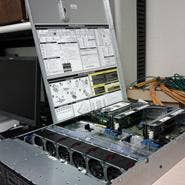Review: HP ProLiant DL380p Rack Mount Server

In the crowded world of rack servers, the HP ProLiant DL380p 2U server stands out. This eighth-generation ProLiant offers twice the memory capacity of its seventh-gen predecessor, a third more cores and as much as triple the storage capacity -- a maximum of 36 terabytes of internal SATA.
Add a low starting price, numerous configuration options, advanced management features and stellar benchmark performance and the result is a solid choice of computing platform for companies large and small. "It's big in data centers, and it's a top seller for small business because it's so flexible," said Barry Brooks, product marketing manager for the HP ProLiant DL380p eighth-generation server.
"You've got multiple drive cages, up to 24 memory DIMMs, and you're not confined to which NIC is on the motherboard." The starting price of $2,896 includes one Intel Xeon E5-2600 series processor, minimal memory, no hard drive or operating system, a 4 x 1 GB NIC and a single 460 W power supply. The system as tested for this review would have a list price of $16,921.
[Related: HP Launches New Support Services For ProLiant Gen8 Servers ]
The eight-gen, two-socket server is the first to use HP's all-new method of processor mounting. "Processor placement was the biggest cause of system failure," according to Brooks. "Smart Socket is designed to ease your pain if you want to do a processor change out," he said. A proprietary chip insertion mechanism prevents bent pins. Period.
Also new in the DL380p, which also lends to its fast IO performance, is the Smart Array P420i controller, an updated version from the seventh-gen with support for up to 25 internal hot-plug 6 Gb/s drives, SATA, SAS or SSD in 2.5- or 3.5-inch form factors with support for RAID 0/1, 1+0, 5, 6, 50 or 60. The device can handle as much as 2 GB of DDR3 cache memory running at 1,333 MHz with data retention and flashback write cache.
NEXT: ProLiant Performance Results
Benchmark scores of HP's eighth-gen ProLiant DL380p were high enough (at the time of testing) to land it atop CRN Test Center's all time list for Geekbench performance. It also turned in strong throughput and transactional performance as measured by an Iometer.
The tested system was equipped with two Xeon E5-2690 2.9 GHz processors, 128 GB of 1,600 MHz memory and Windows Server 2008 R2 Enterprise SP1. The system arrived preconfigured with an eight-drive array of 600 GB, 6 Gbps 10K (2.5-inch) SAS drives and controlled by HP's on-board P420i Smart Array.
After setting Windows properties for maximum performance, testers launched Geekbench 2.3 from Primate Labs and kicked off the 64-bit benchmark tests. The highest of the ProLiant DL380p's five scores was 36,295, which at the time was the highest score we had ever seen. Only weeks before, the bar had been set at 30,923 by Dell's PowerEdge R720 with Xeon processors running at 2.6 GHz. Later the Test Center received an R720 with processors on par with those in HP's tested server. The 2.9 GHz processor-equipped PowerEdge R720 turned in a superior Geekbench score, putting it back in the top spot on CRN's all-time list.
In tests of throughput and transaction processing, the Iometer reported admirable scores, but not the fastest we've seen. Its highest observed throughput was 442 MB per second when reading 32 KB data blocks. In transaction tests, the DL380p sustained a read rate of 161,000 IOps 512-byte blocks. All tests were performed from a queue of 24 IOs per target, which we determined with our standard incremental method to be the optimal setting.
HP has worked hard to simplify system administration from both inside and out. The tools-free cabinet design is a dream to work on, with virtually all internal components removable by manipulating tabs and levers that are clearly-labeled in English. As always, diagrams on the underside of the system lid identify internal components, external ports and other points of interest; there's no reason to scramble around for manuals.
And, eighth-gen systems now implement a revamped Integrated Lights Out (iLO) management engine, an agentless system that performs system monitoring and diagnostics, logging from persistent internal memory separate from the operating system. "It's all on the motherboard," said HP's Brooks. "It keeps track of the health of all systems and holds all the information." This enables administrators and engineers to gain access to system health and performance data right up to the time of a fault.
For organizations large and small that seek a highly performant and flexible system with advanced management and monitoring capabilities, the CRN Test Center recommends HP's eighth-generation ProLiant DL380p server.
PUBLISHED JULY 6, 2012